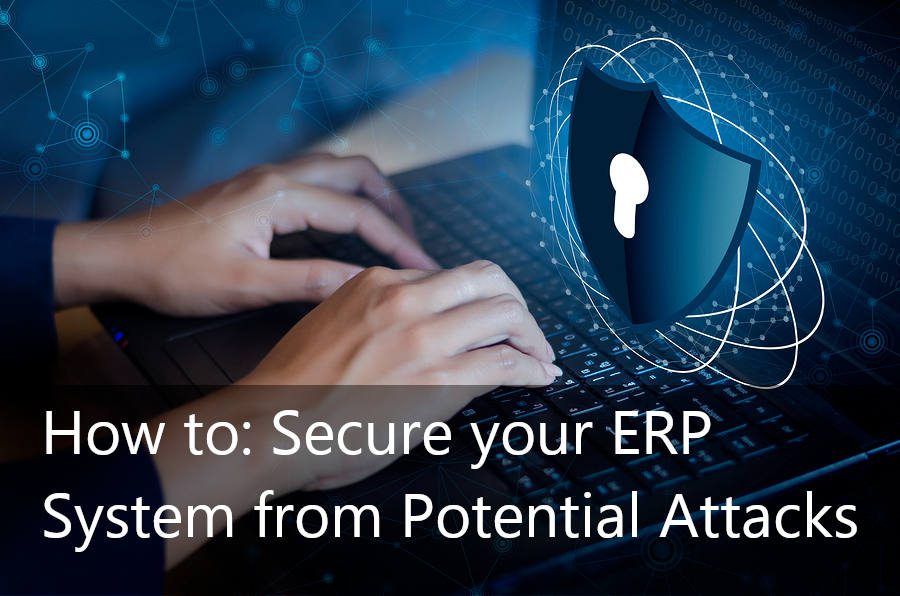
Is your ERP system fully secured from potential cybercriminal attacks? ERP systems stores companies’ sensitive information and it can always be the next victim of hackers. That is why at TMC, we stress to provide the top notch service with maximum security by recommending Cloud-based ERP systems.
ERP System Attacks
Unfortunately, a company that had an on-premise ERP solution—not a TMC implementation—was a victim of data breach by a ransomware attack. The hackers wiped out all of the company’s data; therefore, the company frantically migrated their ERP to a Cloud. “What went wrong,” you might ask. The company thought their on-premise ERP system was fully secured, but they failed to keep their network security updated; causing a “hole” for cybercriminals to “peep in their business.”
According to Healthcare IT News’ article, it states, “The U.S. Department of Homeland Security is warning organizations… [of] criminal group and hacktivist activity against enterprise resource planning systems used to manage finances, human resources and other business activities.” In additions to this hack predicament, Forbes stated, “The raging debate on whether Russian hackers had something to do with swaying the American election illustrates this, and also underscores the importance of Cloud security and the need for maintaining data integrity.” This shows how much data-hacking is increasing as we speak, and you have to ensure your ERP system’s security.
Busting an ERP Myth
Myth: On-premise ERP solution is safer than Cloud-based ERP
You might think having an ERP system on-premise specifically means you have full control over it since it is in “your house.” Take in consideration on what happened to a company which is stated above. At TMC, we use a trustworthy datacenter host such as Microsoft’s Azure Cloud to provide maximum security and optimal reliability. Consider these Cloud-based ERP system’s features:
- Protection Regular backups, failover capabilities, and intrusion prevention
- System maintenance Software and hardware updates to ensure the latest features
- Environmental protection fire detection, network connectivity, climate and temperature system control
- Many more protective features!
5 Tips to Secure your Cloud-based ERP System
- Make sure you are up-to-date The regular updates offered via the Cloud that delivers you updated, new features and helps secure your data. Always accept or keep it on automatic updates.
- Restrict entry to certain information Only permit employees access to parts of the system that is related to their jobs, which is an option that Cloud ERP offers.
- Data Loss Prevention (DLP) Cloud provider, such as Microsoft Azure Cloud, offers Cloud file storage and collaboration platform that scans attachments
- Encryption option Use appropriate encryption based on your data and business, technical requirements
- Train staff with security habits Raise awareness by reminding employees that unprotected attachments in email can cause virus and potentially hurt the whole system
Recommendation: Migrate your ERP to the Cloud
Every company’s’ data are always at risk because of cybercriminals trying to hack into their databases such as ERP systems. Bottomline, companies should migrate their ERP systems to the Cloud. Companies (e.g. Healthcare industry) need constant secure technology; 76% of enterprises are restricting access to sensitive data to limited individuals. With the use of ERP systems, it leverages advanced analytics and threat intelligence to detect attacks; and simplifies investigation for rapid threat response. Lastly, it uses access and application controls to block malicious activity.
At TMC, we recommend all our clients to migrate their ERP solutions, such as Microsoft Dynamics: GP, NAV, or 365, to the Azure Cloud. We recommend to migrate to the Azure Cloud in order to maximize the potential of their solution without sacrificing network’s security. We understand that everything should be running smoothly and give the piece of mind, because almost everything is automated in the Cloud. And on top of all that, who wouldn’t trust Microsoft, one of the leading technology companies that continues to innovate constantly.
If you have any questions or doubts regarding Cloud migration, feel free to contact us or visit our website.





